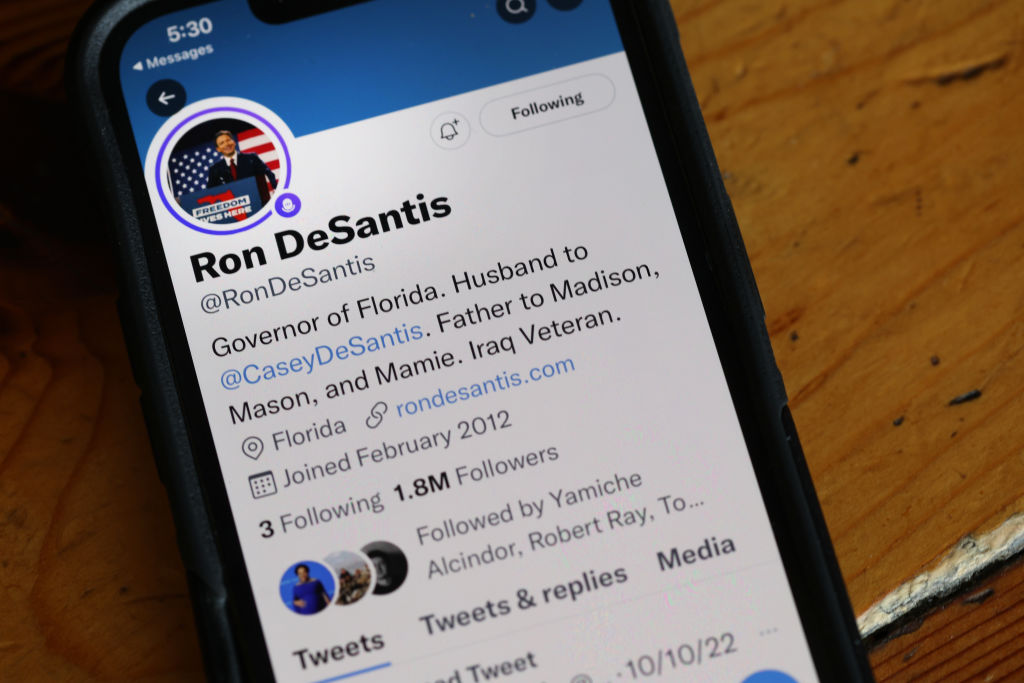For years, in both sympathetic and unsympathetic parts of the press, DeSantis has been hyped as “Trump without the baggage,” “Trumpism without Trump,” “Trump without the brains.” But the first few days have proved these formulations to be, at best, oversimplifications, and perhaps even mischaracterizations.
In an especially smart Washington Free Beacon column, Matthew Continetti argues that DeSantis’s launch event, once it got past the embarrassing glitches, demonstrated that the clash between Trump and DeSantis over the GOP nomination “is also a struggle between two concepts of the New Right, pitting the former president’s MAGA populism against the Florida governor’s institutional culture war.”
Trump, Continetti argues, is a populist in a familiar American mold: “Tribunes of the people have sprung up to rail against the Eastern elites for centuries. Jackson, Bryan, Wallace, Buchanan, Perot, Palin — the list is long.” DeSantis, as Continetti explains, doesn’t belong in that category. He’s not the rhetorically slick rabble rouser that Trump is — as was obvious to anyone who figured out how to listen to his Twitter Space launch this week. Rather, he’s a New Right technocrat. Continetti again: “DeSantis’s attitude isn’t the ‘LOL nothing matters’ or ‘burn it all down’ mentality you find among some MAGA devotees. He isn’t anti-institutional. He wants to use the institution he controls — government — to rescue or defang other institutions consumed by wokeness.”
The days since DeSantis made his presidential campaign official have demonstrated a willingness to target Trump head on (particularly over Covid), but they’ve also made clear just what different approaches the two main contenders take to politics.
For a neglected but intriguing example of this important difference between Trump and DeSantis, consider the two candidates’ approach to the Federal Reserve. Central banking is not high on the list of most GOP presidential candidates’ talking points, but it’s something DeSantis has been curiously keen to bring up. It got a mention in his Twitter launch. Last month DeSantis used speaking engagements to critique the monetary policy failures that have worsened the inflation problem. In March, DeSantis unveiled Florida legislation to prohibit the use of Central Bank Digital Currency (or CBDC). Not exactly a major issue on the campaign trail, but a major concern for those worried that centrally controlled digital currencies pose a threat to freedom.
Contrast that approach to Trump’s. How does he talk about the Federal Reserve on the campaign trail? He hardly does, of course. Asked about Fed Chair Jerome Powell in March, Trump told Fox News’s Sean Hannity: “I had my own situation with Powell and I beat the hell out of him.” In other words: I won. On one level, it’s an entirely unsurprising comment from Trump, who is more interested in being top dog than anything else. On another, it’s a strange boast. “I didn’t like him, he’s too interest rate happy,” Trump told Hannity. Trump was a dove on interest rates throughout his presidency, but not out of any considered economic thinking, but because letting it rip suited Trump.
That’s a clear difference of opinion with DeSantis, who has complained that Powell wasn’t trigger happy enough. But it’s also a neat demonstration of the differences between their approaches. DeSantis down in the weeds not just of monetary policy but the obscure concept of CBDCs. Trump, the populist bulldozer, convinced Powell was out to get him and his people.
DeSantis’s technocratic style delivered results in Florida, especially on the pandemic, that meant he cruised to reelection as governor. Those results are also why he has emerged as Trump’s biggest contender. Going all the way to the White House, though, will require more. Technocratic focus on details works in office. The demands of the presidential campaign trail are rather different — as this week made clear.
On our radar
DEAL OR NO DEAL Work requirements are reportedly one of the few remaining sticking points in negotiations between the White House and House Republicans over a debt-ceiling deal. Reports suggest a two-year deal is in the cards, pushing the next deadline past the election. But, as any negotiator will tell you, nothing is agreed until everything is agreed. Meanwhile, deputy treasury secretary Wally Adeyemo said that Biden will not invoke the 14th Amendment, the (unconstitutional!) nuclear option preferred by the president’s progressive wing. Legislators, focus: only a few more hours left to save your Memorial Day weekend plans.
BORIS AND TRUMP TALK UKRAINE Former British prime minister Boris Johnson has been in America drumming up support for Ukraine. In Texas he met George W. Bush and a group of other politicians and donors for lunch. Yesterday, Johnson dined with Trump. A spokesperson told Politico that the blond duo discussed “the situation in Ukraine and the vital importance of Ukrainian victory.” How much agreement was there though? Trump hasn’t always been especially clear about who he hopes comes out on top in Ukraine.
*** Sign up to receive the DC Diary in your inbox here ***
Texas may strike down Ken Paxton and find him more powerful than ever
The general attitude among Texas Republicans toward the impeachment report prepared against Attorney General Ken Paxton is that they didn’t just already know some of it — they knew all of it.
Paxton is the most Trumpian figure in statewide politics in Texas. He is widely known for his ethics problems and all manner of lawsuits and investigations, but he is also a reliable transactional conservative — the sort to ask the conservative base, “is this the thing you want? Then I’ll do it, with gusto.” But his current travails, where he faces the real risk of impeachment for a litany of breaches, deceptions and inappropriate donations, are actually part of a broader, long-simmering war between Texas donor bases whose priorities often clash in Austin. Does he deserve to be impeached and removed? Maybe he does! But why is it happening in the final three days of the session in Texas?
The Bryan Slaton scandal is a trigger here. Slaton, a loudly socially conservative House member who was expelled for getting a nineteen-year-old intern drunk and having sex with her, was supported by some of the same financial backers who back Paxton. Did he deserve to be expelled? Of course. But the fact that he was kicked out rankled conservative supporters who viewed it as a shot across the bow from House Speaker Dade Phelan. Phelan is a moderate Republican whose priorities are maintaining power and kicking dirt in the face of what he views as the crazy wing of his party. In Texas, it’s fair to say that “crazy” wing is also known as “the base.”
Since ascending to the speakership in 2021, Phelan has been a giant disappointment to conservatives in Texas, who hoped the malleable east Texan would move on multiple legislative reforms. Instead, he’s turned out to be a Mitt Romneyish figure who doesn’t care about moving the state in a proactively conservative direction. The Senate priorities on universal school choice, property taxes, and ramping up border enforcement are all things Phelan doesn’t want to push through the House.
So what do you do if you don’t want to vote on any of those issues in the final days of a legislative session? Well, you impeach the Attorney General of Texas.
Phelan felt serious heat from the mutual backers of Slaton and Paxton from west Texas and decided that the best course of action was to turn up that heat. To dodge the priorities of the more conservative Senate and Lieutenant Governor Dan Patrick, Phelan decided to choose a target where the media, both local and national, would be on his side.
Where Phelan could be miscalculating is that by lumping all of Paxton’s sins together to pursue this course, he’s creating a divisive primary issue for every single Republican member. Their desire to dodge the Senate’s conservative priorities is real — but is it worth it to impeach a popular conservative with well-heeled backers? If they vote for impeachment, the conservative base will come after them, and those same west Texans will fund their primary challengers. If he’s overplayed his hand, Phelan may end up losing his speakership due to the resentment over forcing such a vote on his fellow Republicans.
Whatever you think of Ken Paxton, he is a cunning politician. Having denounced his critics as RINOs and traitors, and Phelan as a drunk, he seems to be calculating based on Trumpian assumption that yes, the House will impeach him — but then he intends to fight like hell in the Senate, where he can escape conviction.
There are all sorts of historically unprecedented wrinkles here. Paxton’s wife serves in the Senate, and she is under no obligation to recuse herself. In Texas, impeachment means that Governor Abbott has to pick somebody to be acting AG until the trial is resolved — and he could well pick a Senator for that role. While multiple Republicans endorsed Paxton’s opponents in the last cycle, they may not want to take that role or go along with a risky vote. At the same time, they know that if Paxton does find a way to weasel out of this and return to his job, he will make everyone’s life a living hell. In the Texas system the Attorney General exercises outsized power, and he’ll come gunning for House members out of vengeance and then probably try to use his Teflon status to run for higher office.
For almost a quarter century, the Republican Party has totally controlled Texas. While it’s transformed the state in many ways, the party has also grown fat and happy, bloated and lackadaisical, slouching into a lazy, nepotistic apparatus as easily as a worn leather chair in a cigar bar where the waitresses wear skirts that are just an extra inch too short. Paxton’s existence is a ramification of that — and so is the mess that Texas Republicans have on their hands today..
–Ben Domenech
Endorsements With Attitude
The unlikeliest foreword of the week accompanies former Trump and Jared Kushner acolyte Ja’Ron Smith’s new book, Underserved. “This book is about failures and successes. It shows a pathway for many communities to rise,” writes NWA rapper Ice Cube, in a statement co-written with Jeffrey Kwatinetz. The 21 Jump Street actor worked with Smith and his co-author Chris Pilkerton in attempting to enact the Contract with Black America after they left the Trump administration. Their book release must have been A Good Day….
–Cockburn
From the site
Roger Kimball: A republic in name only
Charles Lipson: Can DeSantis clear the giant orange roadblock?
Freddy Gray: Can Trump’s opponents prove him wrong on Ukraine?
Poll Watch
PRESIDENT BIDEN JOB APPROVAL
Approve 42.1% | Disapprove 55.6% | Net Approval -13.5
(RCP Average)
DEMOCRATIC PRESIDENTIAL NOMINATION
Joe Biden 60% | RFK, Jr 20% | Marianne Williamson 8%
(CNN)
Best of the Rest
D.D. Guttenplan and John Nichols, the Nation: Biden must remake his candidacy
Charlie Cook, Cook Political Report: Why Democrats should be nervous
Noah Rothman, National Review: The war on things that work
Henry J. Gomez, NBC: A North Dakota governor running for president? You betcha
Lance Morrow, Wall Street Journal: Tim Scott and the politics of forgiveness
Judge Glock, City-Journal: Welcome to the world of minority contracting

























